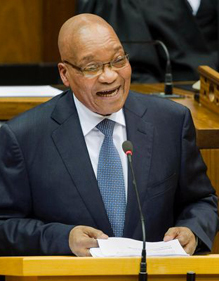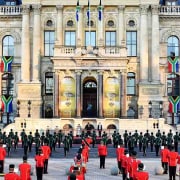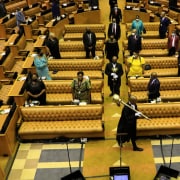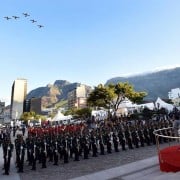|
Getting your Trinity Audio player ready...
|
 President Jacob Zuma’s 2013 State of the Nation Address, delivered yesterday evening, did not impress much. His message on corruption lacked a critical element of redress – accountability.
President Jacob Zuma’s 2013 State of the Nation Address, delivered yesterday evening, did not impress much. His message on corruption lacked a critical element of redress – accountability.
Zuma did a reasonably good job of hailing the work done by those organs of state tasked with fighting the corruption that has worried many South Africans for several years. But many citizens, and the business sector, were looking for more this year than before, namely accountability on the government’s part for the actions of its officials who transgress, costing taxpayers millions every year.
Among the achievements the president highlighted in his speech was the successful work of the Special Investigating Unit (SIU), which he partly attributed to its expanded staff capacity. SIU employees have risen from 70 to over 600 in the 17 years since its establishment in 1996. He had made 34 directives to the SIU since 2009 to investigate fraud and corruption in state departments and entities, and these had been successes, he added.
“Criminal investigations were initiated against 203 accused persons in 67 priority cases under investigation by the end of September 2012.” Also, R512-million in assets had been recovered by the Asset Forfeiture Unit, and would be channelled towards fighting crime.
The SIU has not had a permantent leader since 2011, when, in a surprise move, Willem Heath resigned a month after being appointed by Zuma. Heath became embroiled in controversy in December 2011, after he claimed in a newspaper interview that there was an agenda by former president Thabo Mbeki in Zuma’s rape and corruption trials before he was elected president. Advocate Nomvula Mokhatla was named as acting head by Zuma later that month.
With no direct statement on how any of the high-profile cases involving Cabinet members would be dealt with, Zuma’s speech failed to engender confidence in the government upping its game and dealing with corruption from the top down.
In the past year, public protector Thuli Madonsela and auditor-general Terence Nombembe have both exposed wrongdoing by senior government officials, among them former national police commissioner Bheki Cele and Agriculture and Fisheries Minister Tina Joemat-Pettersson.
One of the controversies involves Communications Minister Dinah Pule, who is at the centre of questions over a R6-million “management fee” that her boyfriend Phosane Mngcibisa charged for his part in organising the ICT Indaba in Cape Town in 2012. Pule’s department, along with businesses in the ICT sector, was responsible for hosting the event.
Earlier in the week, Nombembe pointed out that provincial and local governments were a long way away from full compliance with financial management and reporting legislation, leaving room for corruption in their departments.
Earlier on Thursday, National Anti-Corruption Forum chairperson and Corruption Watch director Zwelinzima Vavi had expressed his hope that there would be some direction on dealing with ministers who contravened the terms of their government contracts.
Business Day Live quoted him as saying: “Unless the ANC can move away from its ‘absolutely no consequences’ approach, and address some of its own weaknesses, there will not be a Lula moment for Zuma.”
According to the website, Vavi made this statement at a roundtable discussion on Brazil and South Africa in Johannesburg, and was referring to the radical economic shift achieved in the South American nation under Luiz Inacio Lula da Silva, who was the president from 2003 to 2011.
The conflict of interest debacle
When the Public Service Commission (PSC) presented the findings of its investigations into corruption and fraud among public officials in November 2012, it revealed startling figures of senior managers in conflict of interest with the government through their private businesses.
These cases appeared across several departments and provincial administrations. Because legislation for doing business with the government only requires that the potential conflict be disclosed, senior managers, the public service watchdog had found, generally saw nothing wrong with their actions.
An added disadvantage to the PSC was the lack of will by departments to report cases of financial misconduct that they investigated, meaning that senior managers who committed fraud or misconduct in their dealings with the state could go unnoticed for a long time.
The supply chain management function across government departments, said the PSC, had “become a very strategic and sensitive area of administration”. The commission made a recommendation to parliament that the legislation allowing senior public officials to do business with the government, as long as disclosure is made of the potential conflict of interest, should be revised.
International perceptions ignored
On a wider scale, the omission of mentioning South Africa’s downgrade by international rating agency Moody’s in September 2012, or that of Fitch and Standard & Poor’s before it, was telling of the government’s stance on accountability. The agency cited an unfavourable investment environment and political instability as factors influencing its first downgrade since 1994, from A3 to Baa1, raising questions among the business sector whether or not the government would address the negative international investor perceptions.
Transparency International’s announcement in December that the country’s ranking among countries perceived to be most corrupt in the world had dropped from 69 out of 183 in 2011 to 64 out of 176 last year also received no attention. The Corruption Perceptions Index is an annual survey done by Transparency International that seeks to establish how the business leadership of countries perceive their government’s efforts to run transparent and effective administrations based on good governance principles.
“President Jacob Zuma has been dogged by corruption allegations in the courts and in the media. It would demonstrate his commitment to transparency and accountability if he released the details of the cost of the renovation to his private residence. It is the lack of access to this information that has fuelled allegations of improper spending,” wrote Cobus de Swart, the South African-born managing director of Transparency International in a recent article that was shared with Corruption Watch.
De Swart was referring to the controversy surrounding the multimillion-rand upgrade of Zuma’s personal Nkandla homestead in KwaZulu-Natal, for which the Department of Public Works said it would pay R206-million towards security.
Commenting on World Anti-Corruption Day in Pretoria just weeks after the Corruption Perceptions Index was released, and days before the ANC’s elective conference in Mangaung, Vavi also directed his message to the leadership of the ruling party, citing conflict of interest as the biggest shortcoming of the ANC government.
“If corruption is not defeated, it will mean the decay and ultimate death of the living body of our democracy,” he said at the time. He hoped that along with other important resolutions, the conference would bring about bold declarations against corruption, while also giving direction on what would happen to those in government leadership who broke the rules.
It did seem that some confidence in Zuma’s position on accountability could be restored among South Africans when, at the ANC’s Mangaung conference, he announced the establishment of the party’s integrity commission.
The news was met with mixed reactions from political analysts and opposition parties alike, more because of the individuals from whom the committee’s structure would be sourced – members of the ANC national executive committee – who included former transgressors such as former MP Tony Yengeni, former Gauteng housing MEC Humphrey Mmemezi and Cele.
No mention of the committee or its key objectives was made by Zuma in his State of the Nation yesterday.









